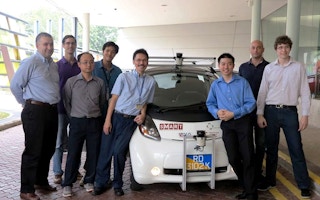Driverless cars in Singapore inched closer towards reality on Tuesday with the launch of ‘SCOT” by the Singapore-MIT Alliance for Research and Technology (Smart) and the National University of Singapore.
To continue reading, subscribe to Eco‑Business.
There's something for everyone. We offer a range of subscription plans.
- Access our stories and receive our Insights Weekly newsletter with the free EB Member plan.
- Unlock unlimited access to our content and archive with EB Circle.
- Publish your content with EB Premium.
Singapore’s first locally-developed driverless car, short for ‘Shared Computer Operated Transport’, is initially retrofitted from a Mitsubishi i-MiEV electric car, and will ply the roads of the NUS campus as researchers seek to improve the technology.
Researchers revealed that the car features a low-cost remote sensing technology called LIDAR, which costs only a fraction of expensive 3-D laser sensors currently used in robot cars. LIDAR’s technology uses laser’s focused imaging and radar’s distance calculation capabilities.
“
SCOT is designed for public roads, is able to operate at a higher speed than current autonomous versions and is able to sense obstacles, and work well in poor lighting as well as in moderate rain
The researchers said SCOT is designed for public roads, is able to operate at a higher speed than current autonomous versions and is able to sense obstacles, and work well in poor lighting as well as in moderate rain.
Professor Emilio Frazzoli, SMART’s lead investigator for the Future Urban Mobility Interdisciplinary Research Group said in a statement that SCOT is a testimony of the researchers and students’ talent, innovation and dedication, considering that “we converted the electric car into a driverless car in just six months at no more than $30,000 for the sensors and onboard computer”.
SMART’s SCOT can drive even in tunnels as it does not rely on global positioning system. Frazzoli said the demonstration is a step towards making driverless cars a reality in Singapore.
“This (the project) will not only help us to learn and improve the system, but also provide a visible platform to increase public awareness and government support in our endeavour to create better transport solutions for urban cities,” NUS collaborator, Associate Professor Marcelo Ang said.
Ang is a faculty member with NUS Department of Mechanical Engineering and also Director of Advanced Robotics Centre at the NUS Faculty of Engineering. He said one of the aims of the project is to deploy a ‘mobility-on-demand’ system in controlled areas such as resorts.
He noted that the advantage of this is that unlike a rented car, the car does not have to be returned. In a country like Singapore, such systems can reduce transportation woes by reducing car ownership while providing one the freedom to have a car when one needs it, he said.

















